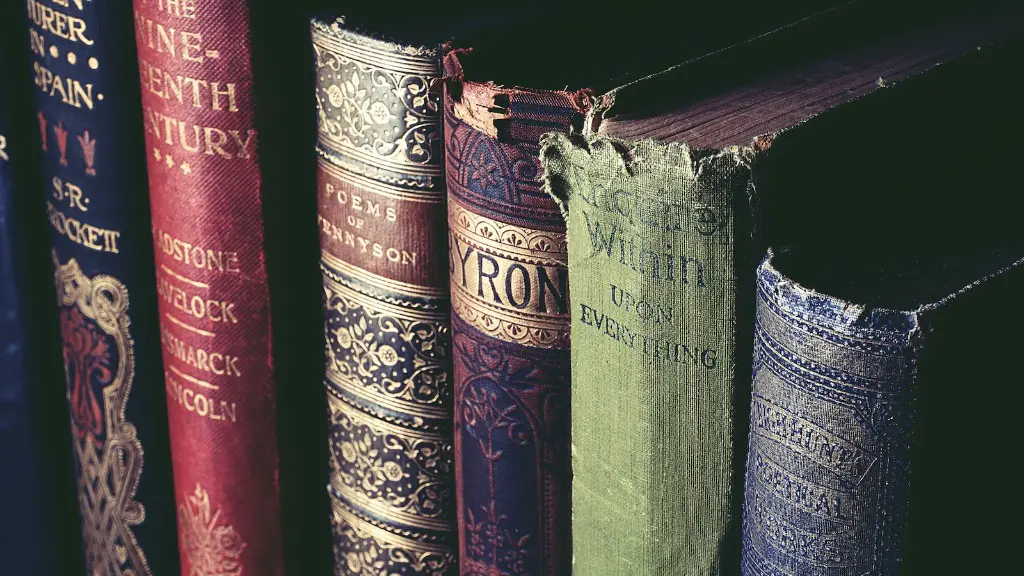Epic poetry is a form of poetry that is characteristically heroic or grand in its scope. It is one of the oldest forms of poetry and can be traced back to the earliest days of human storytelling. Epic poetry is a long narrative poem which focuses on the exploits of a single epic hero or protagonist. In the epic poem, a series of adventures are undertaken by the protagonist as he or she fights to overcome various obstacles in order to ultimately accomplish a great feat. The protagonist is also often assisted by several secondary characters, who may provide advice, education or resources. Examples of epic poetry include Homer’s “The Iliad” and Virgil’s “The Aeneid”
In an epic poem, the narrative often begins in medias res – that is, the action begins in the middle of the story. The reader is then flooded with details regarding the origin of the tale and the events that have led up to this particular moment. The main protagonist is often portrayed as larger-than-life and the obstacles that stand in his or her way are often incredibly daunting. The narrative is often varied and complex, featuring a variety of characters, settings and conflicts.
The purpose of an epic poem is to convey a moral tale, often involving notions of heroism, courage and honor. The narrative can be imparted on the reader through vivid descriptions, captivating dialogue and carefully crafted rhyme and meter. The narrative of an epic poem can be based both on actual events and tales of fiction. What is more, they often include elements of fantasy, legend and myth.
Epic poetry was particularly popular in Ancient Greece, with the first known examples of such poetry dating back to the eighth century BCE. Homer is accredited with the two most renowned compositions in the genre – the “The Iliad” and the “The Odyssey”. During this period, epic poetry was often used to lay out the code of conduct for humanity, highlighting virtues such as loyalty, determination and pride.
In terms of its structure, epic poetry is long and intricate. It generally consists of a number of related episodes, or episodes which are connected by themes. These episodes may cover a range of subjects and topics, each of which has its own significance. Generally, the poem will begin with an invocation or introduction of some sort, which sets the stage for the hero’s quest.
The hero of an epic poem is usually seen as a figure who embodies the values of the society in which he or she is being written. This character is also often portrayed as being utterly fearless and willing to take on any challenge. The hero’s journey is usually one of exploration, as he or she encounters a variety of obstacles and adventures in the pursuit of their quest.
In addition to its heroic tale, epic poetry often incorporates more subtle themes and values. These may include elements of love, religion, morality and the desires of both humanity and the gods. Epic poetry is, in this regard, a symbolic representation of the wider ideals and values of a given society.
Characteristics of Epic Poetry
Epic poetry is typically characterised by a number of elements. These include an invocation of the muse for inspiration, a narrative of a large-scale quest undertaken by the hero, a long list of events or episodes to depict the hero’s successes and failures, and the use of fantastical elements or figures of myth or legend.
The hero of an epic poem is almost always a noble figure, whose courage and bravery are presented as admirable and worthy of imitation. In many epic poems, this hero is seen as a champion of his or her society, who sets an example for other members of the society – and perhaps even humanity in general – to follow. Examples of epic heroes include Odysseus from Homer’s “The Odyssey” and Aeneas from Virgil’s “The Aeneid”.
Epic poems are usually written in a type of verse structure known as dactylic hexameter. This type of verse structure involves using a combination of long and short syllables, with a rhythm that is typically in iambic pentameter. Thus, the meter of an epic poem often follows a measured and metered pattern.
Influences of Epic Poetry
Epic poetry has had a long and influential history and has been an inspiration for many stories and tales written through the centuries. Epic poetry can be seen as having influenced the Arthurian legends of Britain, the tales of Troy, the Icelandic sagas and Homer’s Odyssey, among others. Similarly, the epic of Gilgamesh, one of the oldest existing stories, is thought to have been influenced by the same heroic and mythical themes found in ancient epic poetry.
In recent years, literary figures such as J.R.R. Tolkien and C.S. Lewis have produced works of fantasy which are heavily influenced by epic poetry. These authors were, in part, inspired by the fantastical tales of the Norse sagas, portrayed by the epic poetry of their times. In the modern literary world, authors such as Neil Gaiman and Henry Kuttner have written fantasy works which include elements of epic poetry.
Modern films are also heavily influenced by the epic genre. Historical films based on grand, heroic tales such as The Lord of the Rings films, which were based on the writings of J.R.R. Tolkien, are examples of Hollywood films which draw heavily upon the epics of our past. These films typically feature characters and storylines which are similar to those found in epic poetry.
Impact of Epic Poetry
The impact of epic poetry is still felt across the globe today. From literature and films to modern music, epic poetry can be seen to have a wide reach and influence. Epic poetry has also been important in terms of the way in which it has shaped and influenced the way in which history and culture have developed in many societies around the world.
For centuries, epic poetry has been used to tell the stories of warfare, courage, loyalty, heroism and love. As such, it has been an incredibly powerful tool for conveying the values and morals of a given society across the centuries. Epic poetry has, as a result, become an invaluable source of insight into the customs and values of various cultures throughout history.
<



